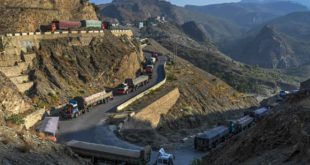KABUL, Mar 4 (IPS) – The rate of return of refugees to Afghanistan from neighbouring countries is causing tremendous stress to the Afghan government and society, government officials here say.
According to the United Nations High Commission for Refugees (UNHCR), in 2007 alone the Iranian government deported over 360,000 Afghans, most of whom struggled to find adequate housing and social services. In addition, thousands more have returned to their home country voluntarily, assisted by UNHCR and government programmes.
Shir Mohammed Etibari, head of the Afghan Ministry of Refugees and Returnees, recently told reporters that the Afghan government does not have the capacity to absorb the large numbers returning from Iran and elsewhere. Officials here worry that the influx of refugees has sparked food, housing and job shortages and fuels resentment against the government.
“We are trying to come to an agreement with Iran, because we are not able to provide for all of these refugees,” says Abdul Qader Zazai, chief advisor to Etibari.
Millions of Afghans fled their homes because of the decade-long Soviet occupation, subsequent civil war and the rise of the Taliban. According to UNHCR spokesman Ahmed Nadir Farhad, for decades Afghans constituted the world’s largest refugee population — at the height of the exodus, up to eight million Afghans were living outside their country, mainly in Iran and Pakistan.
While aid agencies say that the rate of voluntary return has slowed due to the worsening economic and security situation, Iran is deporting large numbers and Pakistan is beginning to do so.
The former refugees say that they are returning to a bleak situation, where a lack of social services, job and food insecurity have sparked disillusionment with the Karzai administration. “It is very difficult to find a job,” Daoud, 35, a returned refugee from Pakistan, tells IPS. “Without a job, we have many problems. Since the government has not given us help, we can’t afford most things. My daughter is sick but I don’t have money to go to the doctor.”
The U.S. reports that Afghanistan’s unemployment rate is at least 40 percent, and rising every year. Kabul’s population has swelled from an estimated 500,000 in 2001 to over three million, according to the Afghan Central Statistics Office, and returning refugees comprise the bulk of this increase. But employment opportunities under the Karzai administration and international presence are at numbers nowhere near the number of job seekers, fuelling widespread discontent.
In addition, skyrocketing food prices threaten to push thousands into hunger. While the problem affects all Afghans, it hits the refugee communities the hardest. “We have nine people in my family,” says Mohammed Tazib, 35. “During this winter, we can’t support our family. Middlemen hoard the food and only sell it when the prices increase. We don’t have enough money to get all of the goods we need. The government doesn’t pass any laws to control the price of goods. The dignitaries in power — especially Hamid Karzai — have not even paid attention.”
The returning refugees also bring an additional problem to Afghanistan’s streets – drug addiction. Iran has one of the highest drug addiction rates in the world, and thousands of Afghan refugees pick up the habit and spread it to their friends and family back home.
Afghanistan now has close to one million addicts, transforming a country known to be relatively addiction free into one of the fastest growing drug populations in the world.
Zakih, 33, returned from Iran six months ago. “When I was working in Iran,” he recalls, “we worked very hard all day. At the end of the day, my boss, who was Iranian, gave me some drugs and said ‘take them — you will feel better'”.
Hundreds of addicts like Zakih live in abandoned parks and bombed-out buildings around Kabul. Most are jobless and are forced to beg and steal to earn their drug money.
“When someone is drug dependent and has no money, anyone can buy him,” says Jehenzeb Khan, director of the United Nations Office of Drugs and Crime Demand Reduction Programme. “They are vulnerable to insurgents, petty criminals, and others.”
“This is directly affecting the health of the society,” he adds. “When so much of the youth are addicted, it is difficult to rebuild our society.”
While the government cites a lack of resources, many insist that supporting the refugees is possible if the Karzai administration and foreign forces focused on developing social services and not just on waging counterinsurgency.
“The Americans are more interested in killing their enemies than rebuilding the country,” says one Afghan media worker, who requested anonymity. Washington currently spends close to ten US dollars on the war effort for every dollar spent on reconstruction.
According to a recent report by the aid watchdog Action Aid, international “donors have failed to deliver money pledged for aid, distributing five billion dollars less than promised between 2002 and 2006.”
Experts say that the trends augur ill for the future of the Afghan government. A U.N. news agency recently reported that the lack of economic prospects is driving poor youths into the hands of the Taliban and fuelling the insurgency.
In the ghettos and makeshift refugee camps that dot Kabul, things have not yet reached this point. But the residents here agree that something must be done. “Government vehicles drive by our camp every day, without stopping.” Daoud says. “We have too many problems — we just can’t continue like this.”
 لراوبر ویب پاڼه لراوبر يو افغان – تازه خبرونه
لراوبر ویب پاڼه لراوبر يو افغان – تازه خبرونه


